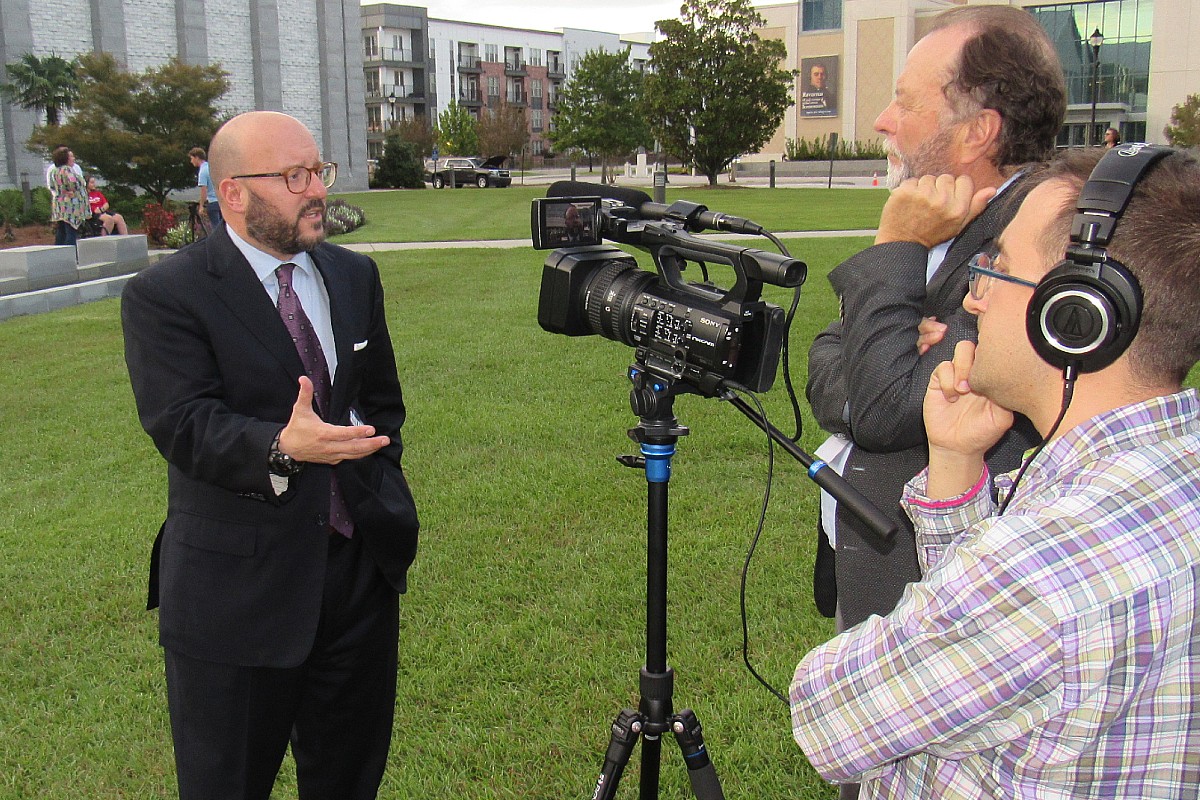Staff reports | A new documentary released last week highlights the divisive political mood of South Carolina and the rest of the country in 2018 with a focus on the emerging political fissures that exploded in this pandemic year with national protests over civil rights and race.
The second episode of the film, A Hard Road: Travels in Trump’s America, features discussions of race, religion, President Trump and politics in South Carolina. Among those interviewed are current Republican congressional candidate Nancy Mace of Daniel Island, GOP state Sen. Tom Davis of Beaufort, former Penn Center Executive Director Emory Campbell of Hilton Head Island, and authors Herb Frazier, Nathalie Dupree and Jack Bass, all of Charleston. Charleston City Paper and Charleston Currents publisher Andy Brack directed the five-part series, now available on YouTube.
Producer and correspondent Bruce Hawker, former chief political adviser to an Australian prime minister, led a documentary team that interviewed more than 130 people in seven states in the weeks leading up to the 2018 midterm elections. The film, which also includes episodes filmed in Arizona, Minnesota and Pennsylvania, focuses on the people, issues and culture of America that impacted the 2018 fight to control the U.S. House and Senate.
Hawker said the purpose of the documentary was to show how Trump’s presidency impacted the lives of everyday Americans.
“Traveling to such diverse parts of the United States as South Carolina, Minnesota and Arizona, we were struck by how diverse and complex American society really is,” Hawker said. “Issues like trade with China are critically important to Minnesota’s farm economy, but are barely part of the political discussions in South Carolina. The border with Mexico and associated issues dominated Arizona politics, but made little impression in northern states.”
He said a common theme across America in 2018 was how divided Americans were.
“Now in 2020, it feels like the rift is even wider,” Hawker said. “I think the effects of the pandemic on people’s health and the economy have heightened tensions. The one concern that almost all the people we interviewed had in common was their desire to see less political division. However, we didn’t see much evidence of a willingness by anyone to make the necessary concessions. Time will tell how that division will be resolved.”
In 2020, the team expected to travel across the country to follow-up on what it discovered in 2018. But the coronavirus pandemic changed plans. For the last two months, the team has been recording footage for a new film by blending interviews taken by independent videographers across the county with long-form interviews via videoconference. A new film is expected early next year.
- Learn more about the film at AHardRoad.com.
In other recent news:
![]() Annual report. You can read the new 2020 Annual Report of the S.C. Ports Authority by clicking here. The agency says it “enters fiscal year 2021 with energy, optimism and resiliency as we welcome new business and complete significant infrastructure projects. Right partners. Right plans. Right time.”
Annual report. You can read the new 2020 Annual Report of the S.C. Ports Authority by clicking here. The agency says it “enters fiscal year 2021 with energy, optimism and resiliency as we welcome new business and complete significant infrastructure projects. Right partners. Right plans. Right time.”
ACA enrollment begins Nov. 1. Health insurers selling Affordable Care Act plans to individuals have lowered rates in some areas or issued only modest premium increases for 2021. Final rates have yet to be finalized. Sign up ends Dec. 15. Read more.
New law on turtles. Gov. Henry McMaster signed a bill this week that bans the commercial trade of native turtles in South Carolina. Turtle and wildlife advocates praised the move as a “meaningful step to protect (the state’s) native turtles,” said Elise Bennett, an attorney at the Center for Biological Diversity. “This law will raise the state out of a morass of turtle trafficking and make it a safe haven for wild turtles.” Read the law here.
S.C. could reject a record number of absentee ballots. Some voting rights groups in the state are warning that mixed messages around a witness requirement and a new bar on ballot curing could lead to disenfranchisement. The witness signature is required for mailed-in ballots, and ballot curing is the process of notifying voters of issues with ballots received without the proper signature. Read more.
Statehouse Report’s Lindsay Street contributed to this report. Have a comment? Send to: editor@charlestoncurrents.com




 We Can Do Better, South Carolina!
We Can Do Better, South Carolina!
























